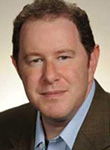Education and threat of civil lawsuits could curb irresponsible online posting, says scholar
By Joyce Wu

A generation ago, memories of reckless mistakes, embarrassing lapses of judgment, harmful gossip and malicious rumors faded over time. But today, with the booming popularity of social media sites and the lightning speed of information travel, a single misstep can mean a lifelong tarnished reputation.
Daniel Solove, a leading scholar on information privacy and George Washington University law professor, suggested changes to American law and new education programs to rectify such problems in his talk, "The Future of Reputation: Gossip, Rumor and Privacy on the Internet," Feb. 3 in the Robert Purcell Community Center Auditorium; the talk was also streamed live on the Web.
Solove noted that the Internet is a double-edged sword.
"Information flows freely and enhances self-development and autonomy. It enhances freedom. We can express ourselves to the world. However, at the same time it's making us less free," he said, noting that the net preserves and publicizes information that some people would rather keep private. He cited many cases of individuals who had their most shameful moments posted online and later became defined by their "15 minutes of infamy."
How American laws protect free speech exacerbates the problem, he said. "As technology becomes so much more widespread, as everyone runs around with their cell phone cameras, as more and more surveillance cameras are out there … it becomes easier to document every little facet of our everyday lives," he said.
Consequently, public and private realms no longer have distinct boundaries. Even deep secrets told to friends in confidence can be posted without consequence, said Solove. The law assumes that when a person reveals a secret, whether to a person or to the blogosphere, he does not expect confidentiality. Once information has been published online, First Amendment free speech rights protect it from being removed.
To manage the delicate balance between free speech and online privacy, Solove proposed a "middle ground approach," where the threat of civil lawsuits would be used in a preventive manner to discourage Internet users from posting online irresponsibly.
But, "Beyond the law, there is [also] a norm that is developing that … is somewhat troubling, a norm that says, well, share everything, write about everything," he said. To counter the norm, he argued for education programs that would reverse trends in Internet openness and teach the consequences of information free flow.
While "generation Google" has created an environment where information is accessible and bountiful, it has limited the luxury of privacy and preserved mistakes that some people would rather forget, he said. "I think for a lot of people, they want a chance to have a second chance."
With the right approach, a future where online responsibility and convenience go hand-in-hand is feasible, he noted.
Solove also presented the talk "What Every School Official Must Know About Privacy" and the workshop "Establishing a Comprehensive Privacy Program at Cornell."
The talk was sponsored by the University Computer Policy and Law Program.
Joyce Wu '13 is a writer intern at the Cornell Chronicle.
Media Contact
Get Cornell news delivered right to your inbox.
Subscribe